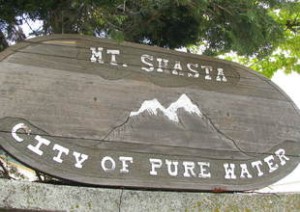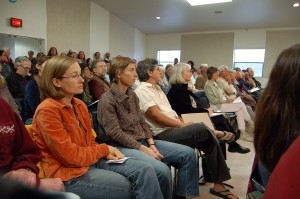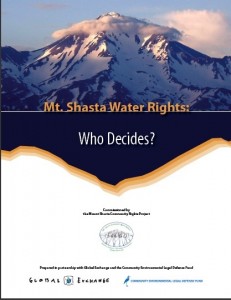FOR IMMEDIATE RELEASE
September 21, 2010
Contact:
Ami Marcus, 530-918-9444 ami@planetvisionproductions.com
Molly Brown, 530-926-0986 molly@mollyyoungbrown.com
Shannon Biggs, Global Exchange, 415-298-9419 shannon@globalexchange.org
MT. SHASTA CITIZENS DENIED RIGHT TO VOTE ON MEASURE “A”
COUNTY COURT RULES THAT CITY FAILED TO FOLLOW PROCEDURE
 On Monday September 20, the Siskiyou Superior Court ruled to keep the controversial water rights initiative, Measure A, off of the Mt. Shasta ballot this November.
On Monday September 20, the Siskiyou Superior Court ruled to keep the controversial water rights initiative, Measure A, off of the Mt. Shasta ballot this November.
Last month, proponents filed an election complaint claiming that County Clerk Coleen Setzer acted beyond her authority to remove Measure A from the ballot. On September 10, Judge Karen Dixon heard attorney arguments for both the proponents and defendant Setzer.
Dixon agreed that what proponents argued in their complaint was true: City Clerk Sandra Studer was indeed the Elections Official for Measure A, not County Clerk Setzer. However, the court did not reinstate the measure to the ballot. Instead, Dixon determined that the City of Mt. Shasta skipped an official step of the elections code by failing to issue a resolution authorizing Setzer to properly verify petition signatures.
“The real concern is that justice was not served by this ruling,” said proponent Molly Brown. “Through no fault of proponents or residents, the right to decide has been stripped from the voters of Mt. Shasta.” The Measure would prohibit outside corporations from bulk water extraction and cloud seeding. It is the first ordinance of its kind in California to assert the rights of residents over the rights of corporations.
“Because the city made a procedural error, citizens are being denied their right to vote,” said Ami Marcus. “Now we look to our City Council to rectify this mistake and ensure that the fate of Measure A is rightfully decided by a vote of local residents.”
Proponents say that the City Council has the authority to remedy the situation, and are hopeful they will take swift action. “Regardless of whether they agree with the content, the City Council has consistently supported the ordinance going to a vote of the people, and we trust that they will do what it takes to make that happen,” states Marcus.
“We don’t blame the city council for their oversight, but we do expect them to fix this,” says Brown. “After literally thousands of hours of volunteer time, hundreds of signatures, and public testimonials before the City Council, a citizens’ initiative can be thrown off the ballot because the City made a minor mistake? How is that democratic?”
“Citizens have the right to place matters on the ballot. They also have the right to ensure that the future of their local resources are determined by those who live there,” said Shannon Biggs, Community Rights Director for the advocacy group Global Exchange.
As for how proponents will proceed, Marcus says that they are exploring their options. “We’re committed to standing for people’s right to vote on issues that affect us in the place that we live. That is, ironically, the central purpose of this rights-based ordinance.”
# # #


